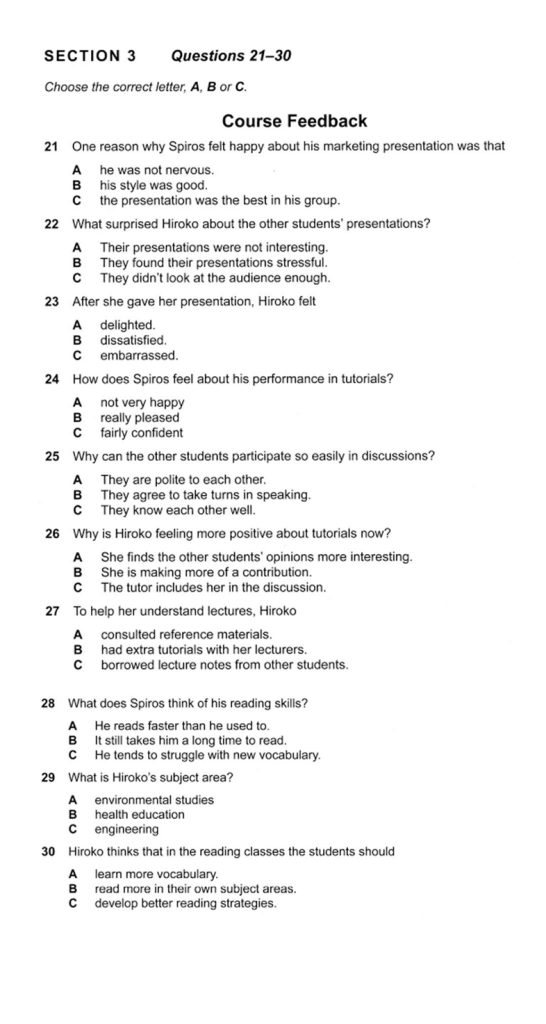No products in the cart.
May 23, 2022

IELTS listening is one of the most challenging sections of the exam. In this section of the exam, multiple choice questions are one such difficult part considered by many candidates. So how to be a pro in the particular part?
Today I’m going to share with you some excellent and perfect secret tips, tricks and strategies to solve multiple choice questions for the listening section of the IELTS exam.
This article will cover tips to solve multiple choice questions , following an example along with its solutions, and in the end, there is a vocabulary practice, so be with me.
Let’s get started.
Multiple choice questions generally appearing in section 3 of IELTS listening are the type of questions that consist of three or more options to choose as a correct answer. Such kinds of questions are one of the trickiest to crack as there are a lot of distractors used in the audio, and the text to read is long given the time frame. Stand out of the crowd with the following sample type of Multiple choice questions.
First, you have some time to review questions 21-24.

Number 1 tip: When the topic’s title is already given, you have a brief on what the content is revolving. Here it is a Self-Access Centre.
Number 2 tip: Avoid reading all the content of the given questions. For instance, the topic itself, note that the self-access centre or the centre is used many times as a distractor to confuse and consume the time of IELTS aspirants.
Number 3 tip: Read-only what matters. To brief, question 22 reads some teachers would prefer to _____? Read-only – teachers prefer from question text while for the options have eyes on close, move, restrict access. This trick will save you some time and make you confident enough when you hear the audio.
Number 4 tip: As you review the questions, keep in mind that all the topics are in order while listening to the IELTS test. For example, consider the above question list, it goes from students’ opinion to teachers to something of library and directors concern.
Number 5 tip: Be aware that as the conversation will be between 2 to 4 people, they will agree on a topic, then disagree to another, consequently all approving to one. Therefore, be attentive to the meaning.
Number 6 tip: Following the above advice, tricks, and strategies as you hear audio. Only reading the questions while listening can be the biggest mistake to lose a band score in the IELTS exam.
Now listen to the audio and answer questions 21-24.

Number 7 tip: You will listen to all vocabulary used in the options. Try to avoid just listening without understanding. Identical words are placed as distractors to check English proficiency and whether the applicant can actually understand the language. At times candidates who fail to perceive the meaning of audio content tend to mark the wrong answer based on the words they hear.
Transcript of the audio
You will hear the director of studies in an English language centre and a student representative talking about their self-access centre.
While listening to the audio, you must know who the director and student representative are because you will hear exact words from either one’s opinion to distract you.
“Hi Yun, as you know, I’ve asked you here today to discuss the future of our self-access centre. We have to decide what we want to do about this very important resource for our English language students. So, can you tell me what the students think about this? Well, from the student’s point of view, we would like to keep it. The majority of students say that they enjoy using it because it provides a variation
on the classroom routine, And they see it as a pretty major component of their course. But we would like to see some improvements to the equipment, particularly the computers, there aren’t enough for one each at the moment, and we always have to share.”
This paragraph mentions that the centre is a pretty major component of their course, so the answer is C – it is an important part of their studies. It also includes the word enjoy with variation to confuse with the option A, and later there is mention of equipment, but it is not the correct answer.
However, if you miss hearing the actual response, the director again mentioned that teachers agree the centre is a valuable resource.
“Well, yes, the teachers agree that it is a very valuable resource, but one thing we have noticed is that a lot of the students are using it to check their personal emails.
We don’t want to stop you, students, from using it, but we think the computer should be used as a learning resource, not for emails. Some of us also think that we could benefit a lot more by relocating the self-access centre to the main university library bills.”
For question 22, the answer is given using vocabulary for relocating, meaning moving to another place or shifting. So, the answer is B – move the Self-access centre elsewhere.
Number 8 tip – Vocabulary. Using vocabulary, the examiner has tricked you, but if you are a good English reader and listener, the answer is clear and precise. A little bit of knowledge of vocabs can improve your band scores in the lexical resource marking category.
“How do you think the students would feel about that Yun? Well, the library is big enough to incorporate the self-access centre. But it wouldn’t be like a class activity anymore. Our main worry would be not being able to go to a teacher for advice. I’m sure there would be plenty of things to do, but we really need teachers to help us choose the best activities. Well, there would still be teachers present, and he/she would guide the activities of the students. We won’t just leave them to get on with it.
Yes, but I think the students will be much happier keeping the existing set-up. They really like going to the self-access centre with their teachers and staying together as a group to do activities. If we could just improve the resources and facilities, I think it would be fine. Is the cost gonna be a problem?
The answer is B – difficulty in getting help, as the student representative specifies their main worry would be not going to a teacher for advice.
“It’s not so much the expense that I am worried about, and we certainly got room to do it. But, it’s a problem of timetabling the teachers to be in their outside the class hours. If we are going to spend a lot of money on the equipment and resources, we really need to make sure that everything is looked out properly. Anyway, let’s make some notes to see just what we need to do to improve the centre.”
For question 24, the correct option is C – the difficulty in supervising the centre. Cost is not a problem is specified, and nothing is there for space of the centre by the director. Therefore, options A and B get eliminated.
Now, as practice, try and solve the passage below with our tips, tricks and strategies.
Two overseas students called Spiros and Hiroko have just finished their first semester for their university course. They are discussing with their English language teacher how they coped with the course.

Read more :
Academic Writing Task 1 Sample
How to prepare for the IELTS exam?
IELTS Reading – Fill in the Blanks Tips Tricks & Strategies
Top 12 IELTS Listening Tips and Tricks to Score a Perfect Band 9